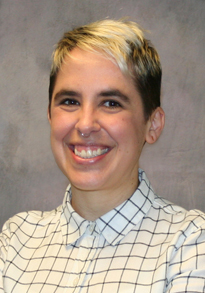Yates Coley, PhD
Biography
Yates Coley, PhD, is a biostatistician whose research promotes predictive analytics and learning health systems as a way to improve value quality, and equity in health care delivery. Their statistical research focuses on developing clinical prediction models that are accurate, actionable, and fair. This work spans several statistical domains including repeated measurements, missing data, and machine learning.
Dr. Coley’s paper examining racial and ethnic inequity in two suicide prediction models was awarded Paper of the Year at the Healthcare Systems Research Network 2021 Annual Conference. The two models performed well for visits by patients who were White, Hispanic, and Asian but did not accurately identify high-risk visits for patients who were Black, American Indian, and Alaskan Native, likely due to persistent structural barriers limiting access to affordable, high-quality, and culturally competent mental health care. The study emphasized the importance of assessing performance within racial and ethnic subgroups of all prediction models before clinical implementation to ensure that prediction models ameliorate, rather than exacerbate, existing health disparities.
Dr. Coley is a graduate of the CATALyST K12 Washington Learning Health System Program funded by the Agency for Healthcare Research and Quality and the Patient-Centered Outcomes Research Institute. As part of their training in learning health system research, Dr. Coley studied current barriers to implementing evidence-based predictive analytics tools to help develop prediction tools that can be deployed and sustained in clinical care. Their research plan also focused on statistical methods to address racial bias in clinical prediction algorithms.
Before starting as an assistant investigator at Kaiser Permanente Washington Health Research Institute (KPWHRI) in 2016, Dr. Coley was a postdoctoral research fellow at Johns Hopkins Bloomberg School of Public Health. There, they worked with urologists to develop a prediction model that enables personalized management of low-risk prostate cancer.
Dr. Coley completed their PhD in biostatistics at the University of Washington. Their dissertation research proposed methods to improve effectiveness estimates in HIV prevention trials by accounting for unobserved variability in risk.
At KPWHRI, Dr. Coley collaborates on projects across a range of research areas including mental health, breast cancer imaging, aging, and health services. They also lead predictive analytics work and direct biostatistical support for KPWHRI’s Center for Accelerating Care Transformation.
Research interests and experience
-
Biostatistics
Bayesian analysis, causal inference, data visualization, hierarchical models, longitudinal data analysis, missing data, prediction, survival analysis
-
Mental Health
Suicide risk, depression treatment, measurement-based care, antipsychotic use in adolescents
-
Cancer
Biostatistics, prostate cancer, risk stratification, stakeholder engagement, surveillance
-
Health Informatics
Biostatistics, data visualization, interactive decision-support tools, learning health systems, stakeholder engagement
-
Health Services & Economics
Biostatistics, clinical decision-support, learning health systems, patient-centeredness, shared decision-making, stakeholder engagement
Recent publications
Toh S, Rasmussen-Torvik LJ, Harmata EE, Pardee R, Saizan R, Malanga E, Sturtevant JL, Horgan CE, Anau J, Janning CD, Wellman RD, Coley RY, Cook AJ, Courcoulas AP, Coleman KJ, Williams NA, McTigue KM, Arterburn D, McClay J for the PCORnet Bariatric Study Collaborative. The national Patient-Centered Clinical Research Network (PCORnet) bariatric study cohort: rationale, methods, and baseline characteristics. JMIR Res Protoc. 2017 Dec 5;6(12):e222. doi: 10.2196/resprot.8323. PubMed
Deng D, Du Y, Ji Z, Rao K, Wu Z, Zhu Y, Coley RY. Predicting survival time for metastatic castration resistant prostate cancer:an iterative imputation approach. F1000Research 2016, 5:2672. doi 10.12688/f1000research.8628.1) PubMed
Coley RY, Fisher AJ, Mamawala M, Carter HB, Pienta KJ, Zeger SL. A Bayesian hierarchical model for prediction of latent health states from multiple data sources with application to active surveillance of prostate cancer. Biometrics. 2016 Aug 22. doi: 10.1111/biom.12577. [Epub ahead of print]. PubMed
Coley RY, Zeger SL, Mamawala M, Pienta KJ, Carter HB. Prediction of the pathologic Gleason score to inform a personalized management program for prostate cancer. Eur Urol. 2016 Aug 11. pii: S0302-2838(16)30472-9. doi: 10.1016/j.eururo.2016.08.005 [Epub ahead of print]. PubMed
Coley RY, Brown ER. Estimating effectiveness in HIV prevention trials with a Bayesian hierarchical compound Poisson frailty model. Stat Med. 2016 Jul 10;35(15):2609-34. doi: 10.1002/sim.6884. Epub 2016 Feb 11. PubMed
Research

Using analytics to prevent adverse COVID-19 outcomes
Paper describes a novel predictive model that identifies patients at high risk of hospitalization or death.
News

When is Paxlovid right for COVID-19 treatment?
New risk model uses advanced analytics to guide informed treatment decisions at Kaiser Permanente Washington.
Healthy findings blog

What motivates Yates Coley’s work on prediction models?
Their work contributes to improved quality of care and better understanding of patients’ needs.
Research

Some adolescents are more likely to use patient portal than others
A new study aims to understand trends in digital care communication among teens.
KPWHRI in the media
Addressing structural racism in clinical prediction models
How structural racism is impacting clinical prediction models
JSM TV, Aug. 6, 2024



